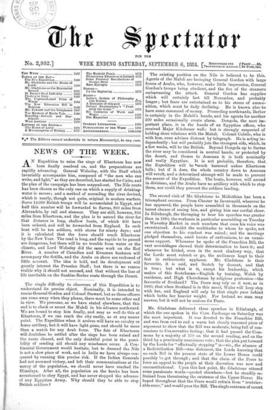Mr. Gladstone delivered three speeches in Edinburgh, of which the
one spoken in the Corn Exchange on Saturday was the most important. It was devoted to the Franchise Bill, and was from end to end a warm but closely reasoned piece of argument to show that the Bill was moderate, being full of con- cessions to Conservative feeling; that it had passed the Com- mons by a majority of 130 on the second reading, and on the third by a practically unanimous vote ; that the plea put forward by the Lords for "effectually stepping" it—viz., the absence of a Redistribution Bill—was dishonest, the Lords knowing that no such Bill in the present state of the Lower House could possibly be got through ; and that the claim of the Peers to force an appeal to the people at their discretion was new and unconstitutional. Upon this last point, Mr. Gladstone uttered some passionate words—quoted elsewhere—but he steadily re- frained from threatening the existence of the Upper House. He hoped throughout that the Peers would refrain from "irretriev- able error," and would pass the Bill. The single sentence of covert
menace to be detected in the speech is the inevitable one :— "Should the passing of that measure be delayed, I have not a doubt that the field of the controversy will become wider still;" but at the close of his second speech he said :—" Let us hope that, without compulsion, without fear, without strain upon the Con- stitution, the monitions of the past may suffice, and that that great assembly, the House of Lords, calling back to life the glorious traditions of its remote past, may take the course which will best tend to place it in close harmony with the affections of the nation, and to prolong its own existence for an honourable share, through ages yet to come, in the direction of the fortunes of this mighty Empire." Mr. Gladstone desires no revolution ; and if it comes, as it will come if the Peers insist on their theoretical prerogative, it will be forced upon him against his will.



































